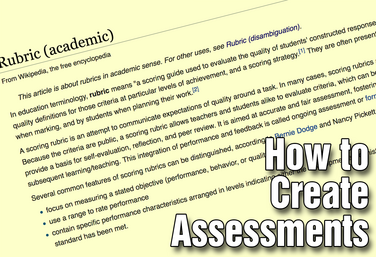Courses

How to Create Assessments
by Maria Smith
Resources
Reflection Sheets
Group Work Rubric
Group Oral Presentation Rubric
Close Reading Rubric
Tableau Rubric
Scene Writing Rubric
Scene Performance Rubric
Reflection Rubric
Point of View Rubric
Participation Rubric
Monologue Writing Rubric
Monologue Performance Rubric
Improv Evaluation Questions
Exit Slip Prompts
Bloom's Taxonomy Action Words
Participation/Positive Contribution Rehearsal Rubric
Participation/Positive Contribution Rehearsal Rubric - Student Handout
Participation/Positive Contribution Rehearsal Rubric - Evaluator
One Question and Rubric: Shakespeare
The Crucible Tic Tac Toe
Romeo and Juliet: Tic Tac Toe
One Question and Rubric: Tennessee Williams
A Midsummer Night's Dream Tic Tac Toe
Improv Rubric
Two-Person Pantomime Rubric
Original Monologue Performance Rubric
Scene Performance Rubric
Middle School Scene Performance Rubric
Middle School Monologue Performance Rubric
Advanced Monologue Performance Rubric
Monologue Performance Rubric
00 - Overview
01 - Important Terms
02 - Assessment Planning
03 - Creating Clear Instructions
04 - Formatting Assessments
05 - Rubrics
06 - Formative Assessments in the Drama Classroom
07 - Summative Assessments in the Drama Classroom
08 - Further Reading
Skills Practice Template
Weekly Ensemble Rubric
PLCs

Assessment in the Drama Classroom
Hosted by Matt Webster, Claire Broome, Matt Banaszynski, Lea Marshall

Assessing Performance
Hosted by Matt Webster, Lindsay Price, Amy Patel, Christa Vogt

Assessment Planning
Hosted by Matt Webster, Lindsay Price, Lindsay Johnson, Maria Smith

Assessment
Hosted by Matt Webster, Lindsay Price, Lindsay Johnson, Shelby Steege

Virtual Assessment
Hosted by Matt Webster, Lindsay Price, Christa Vogt, Lea Marshall

Assessment in the Drama Classroom
Hosted by Matt Webster, Lindsay Price, Claire Broome, Lindsay Johnson